- Home
- Cindy Blackburn
4 Four Play Page 3
4 Four Play Read online
Page 3
“At least they didn’t tamper with the crime scene,” Lieutenant Densmore said. “They could have done a lot worse. Isn’t that right, Captain?”
Wilson agreed, but the wrath of Rita sent Frankie back into apologizing mode.
He looked at me and recommenced a litany of regrets—apologizing for borrowing the Porsche, for driving the Porsche, for parking the Porsche, for ruining the Porsche, et cetera, et cetera.
I whimpered only slightly, and in my most soothing voice, asked him to please stop apologizing.
“Why are you apologizing to her?” Rita’s voice was anything but soothing. “It’s my daughter’s life you’ve ruined. Elizabeth planned on going to law school!”
“I think you mentioned that,” Greg Smythe mumbled.
“There’s no reason Lizzie can’t go to law school,” Wilson said.
“Elizabeth,” Rita corrected.
“Lizzie,” Lizzie corrected.
“Elizabeth!” Rita repeated.
“Lizzie,” Lizzie said.
“Eliza—”
“Stop!” Wilson ordered, and everyone froze. Everyone but Rita, that is. She sputtered out something about police brutality.
Wilson ignored her and returned to the kids. “Tell me about Ms. Jilton.”
Frankie and Lizzie leaned forward to get a glance of each other around Rita, shrugged in unison, and sat back.
Frankie looked at Wilson. “She was a teacher.”
“Like, our English teacher,” Lizzie said.
Wilson took a deep breath. “What else?”
“Huh?” the kids asked.
The social worker helped out. “Elizabeth and Frankie,” he said and waited until they both looked at him. “As Captain Rye has already explained, Ms. Jilton was murdered. Do either of you know anything that could help him?”
“Like, about Ms. Jilton?” Lizzie seemed truly perplexed at the notion.
“She was our English teacher,” Frankie said.
“What about tonight?” Wilson asked. “Was there anything unusual going on?”
“The dance,” Lizzie said helpfully.
Wilson tried again. “Was Ms. Jilton acting strange tonight?”
“She was a teacher,” Frankie said as if that clarified everything.
Poor Wilson gave up and spoke to Russell Densmore. “Verify the time they left the dance. And talk to the cab driver.” The lieutenant nodded, and Wilson returned to the teenagers. “You two understand why?”
They nodded mutely.
“You should have called 911,” he told them.
They hung their heads, and I remembered how hard it was to be sixteen.
***
Wilson endured one more remark about police brutality from you know who before declaring that the interview was over. Everyone seemed more than ready to leave, except for you know who.
Rita sprang up and blocked Frankie’s path. “You are not to see my daughter again,” she spat. “Elizabeth has a future. But you! You stupid idiot!”
“I told you not to call my son stupid.” Mama-Bear Smythe elbowed her son out of the way to block Rita, and I do believe the fists would have flown if Lizzie hadn’t intervened. She finally figured out how to stand up without losing half her dress, and moved quite swiftly to get between her mother and Frankie’s.
“Moooom,” she said. “Like, please stop.”
“Stop!? Your future is at stake Elizabeth Maria Sistina. I will not stop!”
“Well then, we need to leave,” Lizzie said, and the rest of us stared aghast. Had the child had actually uttered an entire sentence without one single like?
While we adults recovered from the shock, Lizzie propelled her mother out the door. Making sure to block Rita’s re-entry, she turned in the doorway. “Sorry,” she said. Her eyes met Frankie’s, and she closed the door.
Laura and Greg waited until the elevator dinged in the hallway before beckoning to their son. Frankie followed them toward the door, but remembered something, and stopped.
“Sorry,” he told me, and I made every effort not to groan.
The social worker exhibited a bit less self restraint. As the door closed behind Frankie he emitted a prolonged sigh, requested an Advil for the road, and rushed off to catch the elevator with the Smythes.
“Jimmy Beak, Superintendent Yates, and Rita Sistina.” Russell looked at his boss. “Why am I thinking the murder is the least of our problems?” He didn’t wait for an answer but headed for the exit. “I’ll meet you at the station?” he asked.
“Soon,” Wilson said, but then he caught a glimpse of me. “Sooner or later,” he corrected himself.
Chapter 4
“I have some questions,” I said the moment the door closed.
“What a surprise.” Wilson pulled the bar stools back to the kitchen counter and took a seat. Snowflake jumped into his lap.
“Let’s start with Lizzie,” I said. “I know that girl from somewhere.”
“Peter Harrison.”
“Ah, yes.” I nodded as I started the tea kettle. Lizzie was one of Peter’s piano students. My elderly neighbor, who lives across the hall from Karen, gives lessons in his condo. “I must have seen her in the lobby.”
“Yep,” Wilson said. “And Rita knew exactly where to come tonight. Lucky me.”
I thought about Rita’s winning personality. “I assume she’s divorced?”
“Oh, yeah.” Wilson informed me the Sistinas had been in court the previous year, about the same time as Ian and I were. “Their divorce was even uglier than yours.”
“Hard to fathom,” I said. “Was there a custody battle?”
“An ugly one.”
I asked how Wilson knew that, and he told me Ray Sistina is a prominent lawyer.
“Lots of cops knew Ray from criminal court,” he said. “So the divorce got discussed.”
“I thought he must be a lawyer,” I said.
“So you caught the threats about police brutality? Rita might want Ray’s help now, but during the divorce she accused him of being crooked.”
I poured the tea. “Is he crooked?”
“Not when he worked in Clarence. He was a partner in Tony DeSousa’s law firm.”
“He’s good then,” I told Snowflake. Unfortunately, I knew from personal experience Tony DeSousa was the best criminal defense lawyer in Clarence.
“Sistina practices in Atlanta now,” Wilson was saying. “He left town after the divorce.”
I sipped my tea and studied my cat. Wilson studied me.
“Do not start thinking,” he ordered. “Ray Sistina had nothing to do with this murder.”
“But if he’s a criminal defense lawyer?” I said. “And Lizzie found the body?” I wiggled my fingers. “Connections?”
Wilson gave me one of his stern cop-like looks.
I moved on to Frankie and Lizzie. “Please tell me you don’t suspect them.”
“I don’t suspect them,” he said, but continued with the stern stare. “This stays between you and me?”
“Absolutely.”
“In particular, the kids’ names stay out of the media. And how Jilton was killed.”
“Absolutely,” I repeated. Believe it or not, I do know how keep a secret. Especially secrets involving Wilson’s work. And keeping the method of murder a secret was almost always part of his strategy. If only the murderer and the cops knew the details, the culprit might slip and say something incriminating.
“You’ll be happy to know Lizzie isn’t tall enough to have done this,” he told me. “Jilton was as tall as you, Jessie.”
I winced. “Lizzie couldn’t have reached her neck?”
“Your friend Smythe could have.”
“Wilson!”
“Relax,” he said. “That kid doesn’t seem capable of swatting a fly, much less killing a teacher.”
I agreed that Frankie is a very sweet boy. “But he wasn’t very helpful, was he? He didn’t know anything about his teacher.”
“You noticed? And he’s not the only one.
I questioned everyone at that dance. All the kids are clueless.”
I asked who had called 911.
“The other chaperone. The gym teacher realized Jilton was missing and went looking for her.”
“In the parking lot?”
“She went out to take a phone call.” He looked up. “And that’s where things get interesting.”
“Let me guess. Her phone’s missing.”
“Yep. And that’s not the only thing that’s interesting.” He reminded me, quite unnecessarily, that my car was interesting also.
“The million-dollar question.” I frowned. “Have you figured out why she was left on my car?”
“How about your license plate? We assume the victim was having an affair, and the killer was making a statement.”
“Okay, so here’s my million-dollar question.” I got up to clear the tea cups. “You somehow managed to hide the body and my car from Jimmy Beak and his cameraman. But not my license plate? Why, oh why, didn’t you cover that up?”
“You realize you just answered your own question.”
I blinked twice. “You couldn’t cover up my license plate, because it would look like you were covering up evidence. To protect me.”
“Very good.”
“And let me guess,” I said. “Forensics now has my car.”
“You’ll be without wheels for a while.”
I sighed dramatically, but Wilson told me to look on the bright side. “No distractions, right? You can stay home and concentrate on Singular Sensation.”
“Seduction,” I corrected. “I suppose it will give me an excuse to hide at home when Jimmy Beak starts accusing me of murder.” I hesitated. “Again.”
“He won’t accuse you of murder.”
“Come on, Wilson. You know the history. The man has it in for me.”
“I had a little talk with Beak before I came over here.”
“Oh?”
“I threatened him with a libel suit.”
“Wilson!”
“Actually, I threatened him with you. I said you’d sue him, and Channel 15, if he accused you of murder again.”
“You didn’t?”
“We can’t hide the fact your car played a role in this. But you sure didn’t.”
I smiled at the baby blues. “Have I mentioned I love you?” I asked, and he grinned.
“But we should call Beak’s boss.” Wilson took his cell phone out and looked up a number. “Name is Cal Ransom. He owns Channel 15.”
He turned his phone to face me and pointed to my land line. “This threat needs to come from you. And you have to mean it, Jessie. Would you be willing to sue if Beak accused you of murder again?”
I thought about Jimmy’s various and sundry denunciations of yours truly—the Stanley Sweetzer fiasco, the Focus on Fiction fiasco, the Romance Writers Hall of Fame-slash-Shame nonsense—
I picked up my phone.
“Be a little scary,” Wilson said as I tapped in the number.
“No.” I pictured Jimmy hyperventilating over my license plate. “I’ll be a lot scary.”
***
“Hello?” Presumably Cal Ransom answered, and presumably I had woken him. “I swear, Beak. If that’s you again, you’re fired.”
“It’s Jessica Hewitt,” I said, and Mr. Ransom dropped his phone.
At least that’s what it sounded like. I waited while he rustled around grumbling a few vague obscenities.
Seemingly recovered, he cleared his throat. “What can I do for you, Ms. Hewitt?”
I glared at Wilson to get into the proper spirit. “You can make sure that stupid reporter of yours doesn’t accuse me of murder,” I said.
“Reporter?”
“Jimmy Beak,” I snapped. Go figure, but being scary was surprisingly easy. Especially when dealing with the person who paid Jimmy a salary to be Jimmy. “If I hear so much as one mention that I was the cause of Miriam Jilton’s death, I will sue him, Channel 15, and you. Is that clear, Mr. Ransom?”
He hesitated. “Umm, did you kill Miriam Jilton?”
“No!” I said, and I do believe he dropped his phone again.
“Beak knows the deal,” he said when he recovered.
“What deal?”
“Beak knows accusing you of murder is off limits.”
“And what will happen if he forgets?” I asked.
“I’ll fire him. And you’ll sue me.”
“Count on it,” I said and hung up without further ado.
Snowflake purred, and Wilson grinned.
I shrugged modestly. “I can be a little scary when I want to be.”
He grinned some more. “No joke.”
Chapter 5
I broke my own self-imposed boycott. The next morning I subjected myself to the Weekly Wrap Up, Channel 15’s “award-winning” Sunday morning news program. No big surprise, Jimmy Beak’s report on the murder was the top story.
First we were treated to a few choice scenes from the high school parking lot, where my Porsche, or more specifically, my license plate, figured prominently. Eventually even Jimmy grew weary of screaming my pen name. He moved on to the arrival of Superintendent Yates and the verbal assault she had seen fit to give Wilson. Ever-helpful, Jimmy had held the microphone to her lips to capture every word.
“Miriam Jilton was a fine educator,” Dr. Yates said. “She deserves justice!”
“Justice!” Jimmy repeated.
The superintendent jabbed Jimmy in the ribs and stepped closer to Wilson. “The exemplary students of this fine school deserve justice also,” she said. “I insist you get to the bottom of this murder! ASAP!”
“Does she really think Wilson isn’t going to get to the bottom of this?” I asked Snowflake.
The two of us were sitting at the foot of the bed. While I watched my seriously-outdated twelve-inch TV, Snowflake conducted her morning toilette. She was cleaning her left front paw when the program cut to the Channel 15 studio.
“You heard the superintendent,” Jimmy told the anchorwoman. “Dr. Yikes will not rest until this culprit is caught! And I know who the culprit is!”
“Don’t say it, Jimmy,” I told the screen as someone behind the cameras yelled, “Cut! Cut to commercial!”
“My threat worked,” I said as Snowflake switched to her right paw. “Jimmy is not allowed to accuse me of murder.”
Indeed not. When the Weekly Wrap Up returned, it was obvious, at least to me, that he had been scolded during the commercial break. The man was visibly pouting.
“Channel 15 has learned from reliable sources that Jessica Hewitt, the borderline pornographer with the Add-a-lay license plate, is not a murderer,” he said. He was rolling his eyes and looking generally skeptical when I turned off the TV.
“There now, you see?” I asked the cat. She twitched her whiskers, and I had to agree Jimmy’s report was still a bit less than flattering.
***
“Are you okay?” Karen asked when she called a few minutes later. “Did you watch the Weekly Wrap Up?”
“I did. I broke my boycott.”
“Do you need some company, girlfriend?”
I thanked Karen for her concern but explained I was already expecting company. I looked at the kitchen clock. “Roslynn must be running late. She’s coming over for a sex-scene session.”
“Say what?”
“You know Roslynn, my fellow romance writer? She and I are going to brainstorm in the hopes of convincing Willow LaSwann and Kipp Jupiter to hop in a haystack together. Have I mentioned A Singular Seduction is a western?”
Karen skipped a beat. “Speaking of company, who were all those people I heard traipsing in and out of here last night?”
“Only everyone and his brother,” I said. “Cops, social workers, parents, kids.”
“Frankie?”
I asked Karen to please forget Frankie’s name and told her only the barest basics about the murder. She understood the deal. Secrets are standard in Wilson’s line of work.
“Don’t worry,” she said. “I don’t remember Frankie’s last name, even if you have told me. So who killed her, Jess?”
“As yet, we know nothing.”
“We?” Karen asked.
“Okay. Wilson knows nothing.”
“Jimmy Beak thinks he knows.”
“The man is desperate to accuse me, correct?”
“I could just see it on the tip of his tongue,” Karen said. “Jessica Hewitt! Murderer!”
“Won’t happen,” I sang.
“You sure about that? We’re talking about Jimmy Beak.”
I explained the reason for Jimmy’s uncharacteristic caution, and Karen was duly impressed. In fact, she promised to testify on my behalf if I ever did end up suing.
Bless her heart, Candy was equally supportive. She called soon after I hung up with Karen, I filled her in on the latest, and she also assured me I wouldn’t have to face Jimmy all alone in a courtroom.
“Or even on TV,” she said. “Come down here at five and we’ll watch the news together. I’ll invite Karen, too.”
“I’m not sure I want to see Jimmy on that wide-screen of yours.”
“My TV is only fifty inches, I have champagne, and I’ll ask Karen to bring Oreos.”
Needless to say, I accepted Candy’s kind invitation.
***
“Give me title, plot, and characters,” Roslynn Mayweather demanded the moment I opened my door.
I blinked at her highly-glossed lips. “I have the title?”
“That was a question, not an answer.” She brushed past me, the heels of her impeccably polished pumps clicking across my wood floors. She stopped, deposited her briefcase on the coffee table, and pivoted. “Since when does Adelé Nightingale have this much trouble writing a story?”
I walked over and shoved the laptop I was holding into her hands. “Since now,” I said. “Read.” I pointed her to the couch and went to fetch the coffee.
I had added milk to my cup, and was stirring the requisite two teaspoons of sugar into Roslynn’s, when I glanced up. Ten-thirty on a warm Sunday morning and the woman was dressed to the nines—tailored skirt suit, Chanel scarf, sheer hose—the whole nine yards.
As for my own attire? Quite a few yards were missing. I was barefoot and clad in my standard writing uniform—a pair of cutoff jeans and one of Wilson’s old dress shirts.

 Undisclosed
Undisclosed Unbelievable
Unbelievable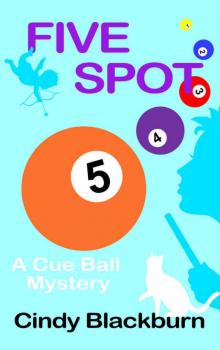 Five Spot
Five Spot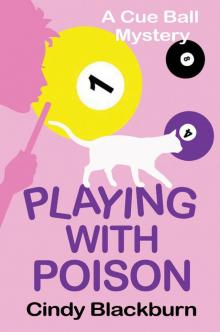 01 - Playing with Poison
01 - Playing with Poison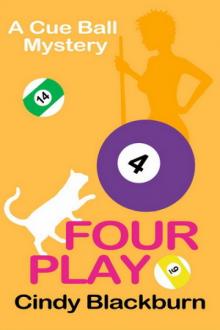 4 Four Play
4 Four Play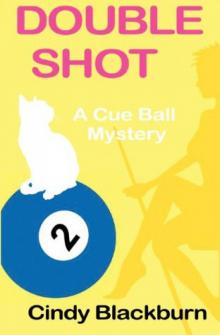 Double Shot
Double Shot Playing With Poison
Playing With Poison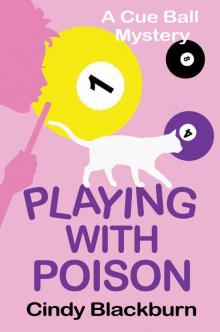 Playing with Poison: A Humorous and Romantic Cozy (Cue Ball Mysteries Book 1)
Playing with Poison: A Humorous and Romantic Cozy (Cue Ball Mysteries Book 1)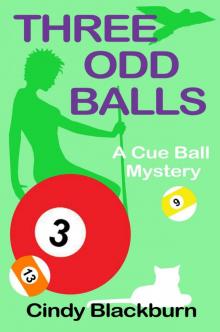 03 - Three Odd Balls
03 - Three Odd Balls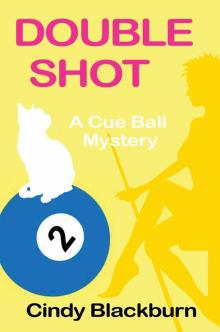 02 - Double Shot
02 - Double Shot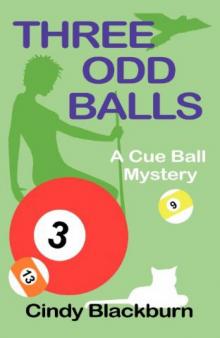 Three Odd Balls
Three Odd Balls